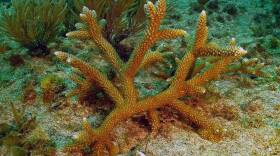-
Rising temperatures, increasing nutrients, and changing currents could all be factors in the algae expansion.
-
The extreme heat comes as the federal government seeks to roll back vehicle pollution standards and rescind a scientific finding on the health threat from greenhouse gases.
-
A temperature increase of just a couple degrees can lead to higher energy bills, stunted plant growth, and more rainfall.
-
The deaths caused by Vibrio vulnificus bacterium were in Bay, Broward, Hillsborough, and St. Johns counties, according to the Florida Department of Health.
-
The researchers are looking for ways to help reefs survive global warming. The work could provide a blueprint for working across the Caribbean to share corals.
-
Many states accepted Inflation Reduction Act funding to address climate change, but Florida turned down the money from the Climate Pollution Reduction Grants.
-
The report says Florida could achieve net zero emissions by 2050 while growing the economy, creating jobs, and reducing energy and transportation costs.
-
We discuss climate change hurdles and solutions with CNN's chief climate correspondent and highlight Florida stories from his book.
-
"If we don't manage them properly, then those seagrasses will be less resilient, and we could potentially degrade a very, very valuable habitat," said Tom Frazer of USF.
-
Global transportation and trade, compounded by people continuing to alter the local environment, have led to the spread of mosquitoes. But how will these insects deal with a warming world?
Play Live Radio
Next Up:
0:00
0:00
Available On Air Stations










